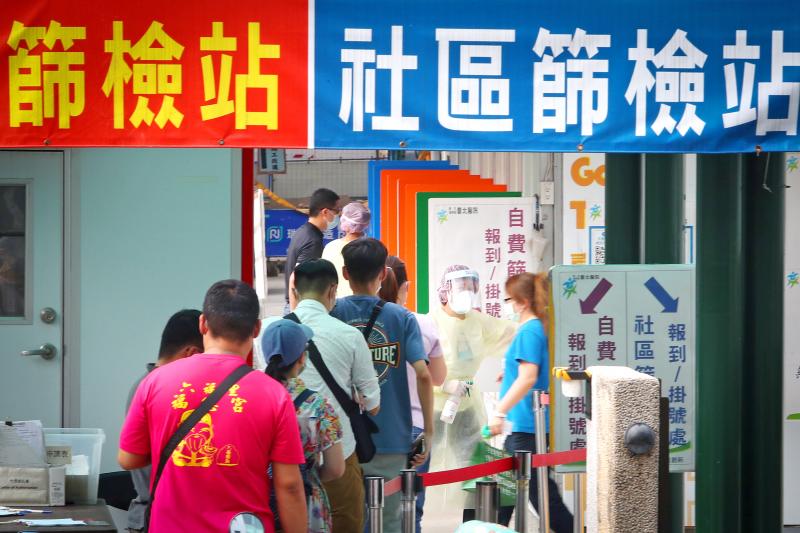The digital COVID-19 certificate system is to be updated today to include the bearer’s national ID number, the Central Epidemic Command Center (CECC) announced yesterday amid concerns voiced by insurance companies that the system lacks a feature to prove identity.
The digital certificate, which became available in Taiwan on Jan. 1, serves as proof of vaccination and COVID-19 test results.
The Financial Supervisory Commission (FSC) over the weekend asked insurers to allow digital certificates to be used for claims in lieu of diagnosis certificates issued by hospitals, drawing backlash from insurers over the authenticity of information provided by those who file claims, among other concerns.

Photo: CNA
Centers for Disease Control Deputy Director-General Chuang Jen-hsiang (莊人祥), who is the CECC’s spokesman, said yesterday the update to the system is to take effect this morning at 8am to include national ID numbers.
FSC Chairman Thomas Huang (黃天牧) yesterday held another meeting with local insurers to address their criticism of the commission’s suggestion that policyholders use digital certificates for COVID-19 insurance claims. However, the meeting yielded no conclusion as of 8pm last night.
Insurers were most concerned that the digital certificates still do not show the doctors’ information, which they regard as necessary to curb fraud, despite the inclusion of national ID numbers.
The certificate only specifies which agency conducted the tests, but insurers said that the terms of their policies require the name of the doctor who gave the diagnosis, so that insurers could resolve disputes directly with the physician.
Honoring policies would be difficult without this information, they said.
Additional reporting by Kao Shih-ching

Sweeping policy changes under US Secretary of Health and Human Services Robert F. Kennedy Jr are having a chilling effect on vaccine makers as anti-vaccine rhetoric has turned into concrete changes in inoculation schedules and recommendations, investors and executives said. The administration of US President Donald Trump has in the past year upended vaccine recommendations, with the country last month ending its longstanding guidance that all children receive inoculations against flu, hepatitis A and other diseases. The unprecedented changes have led to diminished vaccine usage, hurt the investment case for some biotechs, and created a drag that would likely dent revenues and

Macronix International Co (旺宏), the world’s biggest NOR flash memory supplier, yesterday said it would spend NT$22 billion (US$699.1 million) on capacity expansion this year to increase its production of mid-to-low-density memory chips as the world’s major memorychip suppliers are phasing out the market. The company said its planned capital expenditures are about 11 times higher than the NT$1.8 billion it spent on new facilities and equipment last year. A majority of this year’s outlay would be allocated to step up capacity of multi-level cell (MLC) NAND flash memory chips, which are used in embedded multimedia cards (eMMC), a managed

CULPRITS: Factors that affected the slip included falling global crude oil prices, wait-and-see consumer attitudes due to US tariffs and a different Lunar New Year holiday schedule Taiwan’s retail sales ended a nine-year growth streak last year, slipping 0.2 percent from a year earlier as uncertainty over US tariff policies affected demand for durable goods, data released on Friday by the Ministry of Economic Affairs showed. Last year’s retail sales totaled NT$4.84 trillion (US$153.27 billion), down about NT$9.5 billion, or 0.2 percent, from 2024. Despite the decline, the figure was still the second-highest annual sales total on record. Ministry statistics department deputy head Chen Yu-fang (陳玉芳) said sales of cars, motorcycles and related products, which accounted for 17.4 percent of total retail rales last year, fell NT$68.1 billion, or

In the wake of strong global demand for AI applications, Taiwan’s export-oriented economy accelerated with the composite index of economic indicators flashing the first “red” light in December for one year, indicating the economy is in booming mode, the National Development Council (NDC) said yesterday. Moreover, the index of leading indicators, which gauges the potential state of the economy over the next six months, also moved higher in December amid growing optimism over the outlook, the NDC said. In December, the index of economic indicators rose one point from a month earlier to 38, at the lower end of the “red” light.